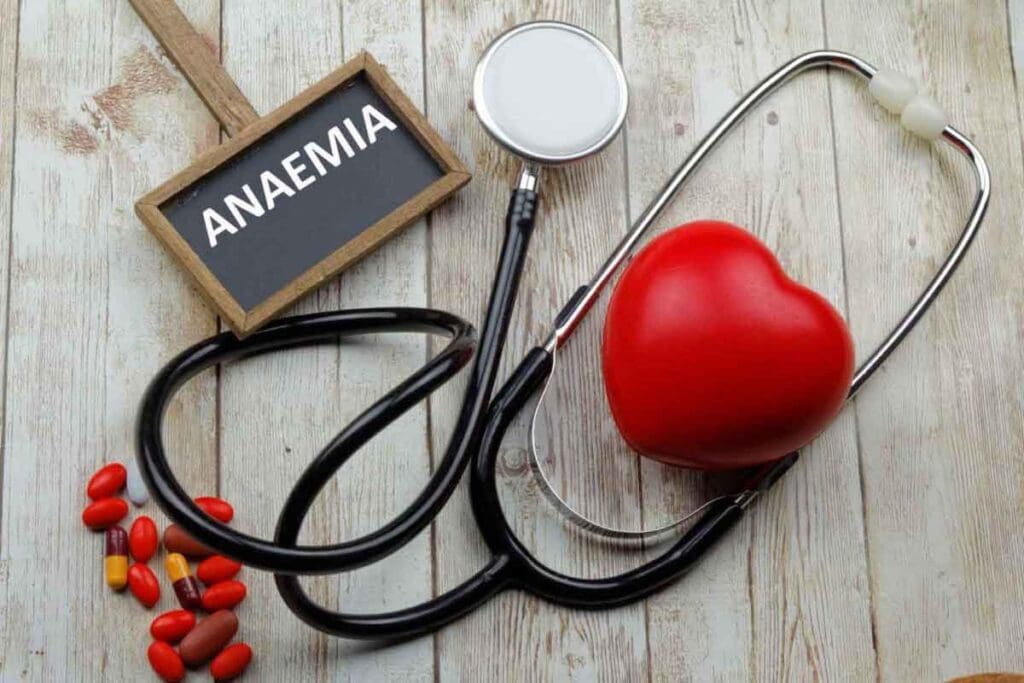Last Updated on November 14, 2025 by Ugurkan Demir

Iron is key for our health, helping make hemoglobin in red blood cells — the protein that carries oxygen throughout the body. When iron levels are low, we might not produce enough healthy red blood cells, leading to anemia. Many people wonder, does low iron cause dizziness? Yes — low iron can reduce oxygen flow to the brain, resulting in lightheadedness or dizziness.
Anemia means less oxygen gets to our brain and other parts. This can make us feel dizzy and lightheaded. Sometimes, it can even cause vertigo. Knowing how iron deficiency affects our brain is important for treating it right.

Iron is a key nutrient that helps carry oxygen around the body. It’s vital for many body functions. It’s needed to make hemoglobin, a protein in red blood cells that carries oxygen.
Iron is essential for oxygen transport. It lets red blood cells carry oxygen from the lungs to the body’s tissues. Without enough iron, cells and organs don’t get the oxygen they need. This can cause dizziness and fatigue.
Oxygen transport involves iron, hemoglobin, and red blood cells. Here’s how it works:
Keeping iron levels normal is important for health. The amount of iron needed changes with age, sex, and health status.
| Age Group | Recommended Daily Iron Intake (mg) |
| Adult Men | 8 |
| Adult Women (19-50 years) | 18 |
| Pregnant Women | 27 |
These are general guidelines. Your iron needs might be different. Talking to a healthcare provider can help figure out what you need.

It’s important to know the difference between iron deficiency and iron deficiency anemia. These two conditions affect health in different ways.
Iron deficiency happens when the body doesn’t have enough iron. Iron is key for making hemoglobin, which carries oxygen. Iron deficiency anemia is when iron is so low that red blood cells decrease in number and size. This makes it hard for oxygen to reach the body’s parts.
Iron deficiency and anemia are not the same. Iron deficiency can happen without anemia if iron levels are low but not affecting red blood cells too much.
Iron deficiency anemia affects many people around the world. It’s thought that 25% of the global population has anemia, with iron deficiency being a big reason. Factors include not eating enough iron, chronic diseases, heavy menstrual bleeding, and disorders that make it hard to absorb iron.
Some groups are more at risk. These include pregnant women, kids, and people with long-term illnesses. Knowing who’s at risk helps in preventing and treating it early.
Low iron levels can make the brain feel dizzy and unsteady. This happens because iron helps carry oxygen to the brain. It’s key for brain function.
Iron is vital for hemoglobin, which carries oxygen in red blood cells. With less iron, the body makes fewer red blood cells. This means less oxygen gets to the brain.
The brain needs oxygen to work right. A little less oxygen can make you feel dizzy. Factors that lower oxygen delivery include:
Low iron affects the brain in many ways. People may feel tired, weak, and have trouble focusing. These symptoms happen because the brain isn’t getting enough oxygen.
The brain needs a lot of oxygen and is very sensitive to changes. Long-term low oxygen can harm brain function, affecting thinking and movement.
Some effects on the brain include:
Dizziness from iron deficiency can affect daily life in many ways. When iron levels drop, the body can’t move oxygen to tissues, including the brain. This lack of oxygen causes different dizziness symptoms.
Lightheadedness is a common symptom of iron deficiency. It feels like you might faint or feel weak. This feeling is worse when you stand up fast or do physical activities. It’s important to know that lightheadedness can mean you have low iron levels.
A study in a medical journal found that lightheadedness and dizziness are common in iron deficiency anemia. This shows doctors should check iron levels when these symptoms appear.
Anemic dizzy spells happen in people with anemia, often because of iron deficiency. How often and how bad these spells are can vary. They can be triggered by exercise, changing how you sit or stand, or even the environment.
As the condition gets worse, dizzy spells might happen more or be more severe. They can make it hard to do everyday things. Knowing what triggers them and taking steps to prevent them can help manage symptoms. For example, avoid sudden changes in position, take breaks during exercise, and eat foods rich in iron.
By treating iron deficiency and its symptoms, people can live better lives. If you have persistent or severe dizziness, see a doctor for help.
Low iron levels can lead to symptoms like dizziness and vertigo. To understand the link between iron deficiency and vertigo, we need to know the difference between dizziness and vertigo. We also need to look at the research that shows iron deficiency’s impact on these conditions.
Dizziness is a wide term that includes feeling lightheaded or losing balance. Vertigo is a specific type of dizziness where you feel like you’re spinning. While both can be very uncomfortable, vertigo is often linked to problems in the inner ear or the vestibular system.
Key differences between dizziness and vertigo:
Research has looked into the connection between iron deficiency and vertigo. Some studies suggest a strong link. Research on anemia and dizziness shows that people with iron-deficiency anemia are more likely to experience vertigo.
| Study | Findings |
| Study on Iron Deficiency and Vertigo | Found a significant correlation between iron deficiency anemia and vertigo recurrence. |
| Analysis of Anemic Patients | Indicated that anemic patients are at a higher risk of experiencing vertigo. |
The research shows that low iron levels can cause vertigo. This makes it important to diagnose and treat iron deficiency to reduce symptoms.
Iron deficiency can affect the body in many ways. It can lead to fainting and orthostatic intolerance. These issues are linked to dizziness and vertigo. They happen because of poor blood flow and oxygen to the brain and inner ear.
Syncope, or fainting, is when you lose consciousness suddenly. It’s caused by a lack of blood flow to the brain. People with iron deficiency anemia are more likely to faint because their blood can’t carry enough oxygen.
Iron is key for healthy red blood cells. Without enough iron, blood pressure drops. This makes fainting more likely.
A study in the Journal of Clinical Hypertension linked iron deficiency anemia to more orthostatic hypotension. This condition can cause fainting. The study stressed the need to diagnose and treat iron deficiency to avoid these problems.
Orthostatic hypotension is when blood pressure drops a lot when standing. This reduces blood flow to the brain. It can cause dizziness, vertigo, and fainting. Low iron levels make it harder for the body to keep blood pressure stable.
| Condition | Effect on Blood Pressure | Symptoms |
| Iron Deficiency | Decreased blood pressure | Dizziness, Vertigo, Fainting |
| Orthostatic Hypotension | Drop in blood pressure upon standing | Dizziness, Vertigo, Syncope |
The table shows how iron deficiency, orthostatic hypotension, and their symptoms are connected. If you’re experiencing these symptoms, see a doctor for the right diagnosis and treatment.
Some groups face a higher risk of iron deficiency’s effects, like dizziness and vertigo. Knowing who these groups are is key to spotting and treating issues early.
Women, mainly those of childbearing age, lose more iron due to menstruation. Hormonal changes during their cycle can make dizziness and vertigo worse. Pregnancy raises iron needs even more, putting pregnant women at even higher risk.
Iron supplements are often advised for pregnant women. But, it’s important to keep an eye on iron levels to avoid too little or too much.
Older adults face risks due to age-related bone loss and changes in how they absorb nutrients. Osteoporosis and similar bone issues can make falls more likely, which is scary for those feeling dizzy or vertigo.
Older adults might also have other health problems that make diagnosing and treating iron deficiency harder. It’s critical to make sure they get enough iron, either from food or supplements.
People with gut problems like celiac disease or Crohn’s disease have trouble absorbing iron. Vegans and vegetarians might also face higher risks because they eat less heme iron, which comes from animal products.
Athletes, and those in endurance sports, might need more iron because of exercise-induced hemolysis. Regular checks on their iron levels can help avoid deficiency and its symptoms.
Feeling dizzy can be scary. Finding out if low iron is the reason needs a detailed check-up. It’s key to fix low iron to stop dizziness and other symptoms.
Doctors use blood tests to check for low iron. They look at serum iron, ferritin, and total iron-binding capacity (TIBC). Serum ferritin shows how much iron the body has. A doctor then figures out how bad the iron deficiency is.
Iron supplements are often used to treat low iron. Doctors might give you oral supplements or intravenous (IV) iron therapy if needed. The choice depends on your health and how well you can take the supplements.
Eating the right foods is also important. Foods like red meat, beans, and fortified cereals are good sources of iron. Vitamin C helps your body absorb iron better, so eating foods with vitamin C, like citrus fruits, is helpful.
Combining iron supplements with the right diet can help manage low iron levels. This can also reduce dizziness.
It’s important to know how iron deficiency can cause dizziness. Getting enough iron can help reduce these symptoms. This can make life better for many people.
To avoid dizziness from iron lack, eat well and consider supplements. Women who might get pregnant and older adults need to watch their iron intake closely.
Dealing with dizziness from iron deficiency requires a few steps. Change your diet to better absorb iron. Also, fix any health problems that might be causing it. Taking care of your iron levels can help avoid dizziness and vertigo.
Learning about iron deficiency and its effects is key. This knowledge helps people prevent and manage dizziness. It’s a step towards better health and less risk of serious problems.
Yes, low iron levels can cause dizziness. This is because the body gets less oxygen to the brain and tissues.
Research suggests iron deficiency might be linked to vertigo. But, the exact relationship is not fully understood yet.
Symptoms include feeling lightheaded and dizzy spells. Some people might also experience vertigo. The severity can vary.
Iron deficiency means less hemoglobin is made. This leads to less oxygen for tissues and organs, including the brain. This results in dizziness.
Women, older adults, and people with certain health issues or dietary restrictions are at risk. Hormonal changes and bone density issues play a role.
Blood tests measure iron levels and hemoglobin. A healthcare professional then interprets these results to diagnose iron deficiency.
Treatment includes iron supplements and dietary changes. It also involves addressing the underlying causes of iron deficiency.
Yes, eating iron-rich foods and vitamin C can help. This can improve iron absorption and reduce symptoms.
Preventing iron deficiency is key. This involves a balanced diet, regular blood tests, and managing health conditions.
Anemia dizziness feels like lightheadedness or a spinning sensation. It can also include fatigue and weakness.
Yes, low ferritin levels mean iron stores are low. This can lead to dizziness due to reduced oxygen delivery.
Yes, dizzy spells are common in anemia, including iron deficiency anemia.
Subscribe to our e-newsletter to stay informed about the latest innovations in the world of health and exclusive offers!